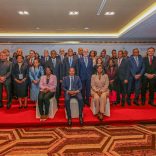Mozambique: Government approves Ressano Garcia International Road Freight Terminal concession ...
Compelling case for Mozambique to declare debts illegal – AIM report

In file CoM
Recent events have greatly strengthened Mozambique’s hand in negotiations with creditors over the illicit debts of over two billion US dollars contracted in 2013 and 2014 from the banks Credit Suisse and VTB of Russia by the three fraudulent, security related companies Proindicus, Ematum (Mozambique Tuna Company) and MAM (Mozambique Asset Management), and there is now a powerful case for Mozambique simply declaring the debts illegal.
The London-based Jubilee Debt Campaign argues that a straightforward refusal to pay would make it easier, not more difficult, for Mozambique to resume normal relations with the International Monetary Fund (IMF), and obtain greater access to donor aid.
The picture has been transformed by the detention in South Africa of former Mozambican Finance Minister Manuel Chang on 29 December on an international arrest warrant issued by the United States, which accuses him of conspiracy to commit money laundering, wire fraud and securities fraud.
It was always clear that the loan guarantees for Proindicus, Ematum and MAM signed by Chang were illegal, since they smashed through the ceiling on government guarantees set in the 2013 and 2014 budget laws, and violated a clause in the Mozambican constitution under which such debt can only be authorised by the country’s parliament, the Assembly of the Republic.
But the American indictment against Chang and several others contains a devastating record of bribes and kickbacks, showing a dense web of corruption linking officials at Credit Suisse, the Abu Dhabi based company Privinvest, which was the sole contractor for the three Mozambican companies, and assorted Mozambican government staff.
Suddenly it became impossible to argue that Proindicus, Ematum and MAM were well-intentioned efforts to boost coastal security and build up a tuna fishing fleet, which just went wrong. The evidence in the American indictment showed that the real purpose of the schemes was illicit private enrichment, plus the sale by Privinvest to Mozambique of fishing vessels, speedboats and other assets at grossly inflated prices.
Chang is fighting to avoid extradition to the United States. Even if he succeeds, and is returned to Mozambique instead, he will not be a free man, since the Mozambican Supreme Court has already authorised his preventive detention pending a trial.
Chang’s arrest emboldened those among the Mozambican prosecutors who wanted to take measures against those implicated in the illicit loans. After three years of an investigation that seemed to be going nowhere, the Attorney-General’s Office this month ordered the detention of nine suspects, including the former head of the State Security and Intelligence Service (SISE), Gregorio Leao, and the former head of SISE economic intelligence, Antonio do Rosario, who became the chairperson of all three fraudulent companies.
Leao reported directly to the then President, Armando Guebuza, and among the others detained are Guebuza’s oldest son, Ndambi, and his private secretary, Ines Moiane.
The Jubilee Debt Campaign argues that these arrests “could indicate that the Mozambique government is now more willing to take strong action against those involved and declare the debts illegal”.
It points out that Mozambique has been in default on all of the debts since mid-2016, and none of the creditors have tried to activate the guarantees or take the Mozambican government to court.
Declaring the debts illegal could open the way to resuming normal relations with the IMF, which is not likely to support corrupt Credit Suisse and Privinvest officials against one of its member states. The campaigners note that the IMF’s willingness to believe a member state rather than creditors dates back to a paper agreed by the IMF Board in 1984 which states “in situations where a debtor disputes the validity of an external financial obligation … the Fund has taken the view that a member’s representation that the debtor disputes the validity of an obligation should be taken as being made bona fide and accepted on that basis.”
In the light of this longstanding IMF position, the Jubilee Debt Campaign argues that “if the Mozambique government were to declare it disputes that it owes the two billion dollar debt, this would be no barrier to a new IMF loan and thus donor aid”.
Such a move would also solve the problem of Mozambique’s debt sustainability. Currently all of Mozambique’s debt ratios are unsustainable – but that is exclusively because of the country’s “commercial debt” (i.e. mostly the Proindicus, Ematum and MAM debts). If this is taken out of the equation, leaving the country’s multilateral and bilateral obligations, the debt, although still substantial, falls within the parameters of sustainability.
The IMF has a policy that it cannot lend if a government’s debt will not be made sustainable over the course of a lending programme. Jubilee Debt Campaign argues that wiping out the illegal two billion dollar debt would restore sustainability, and thus allow the IMF to resume lending. Other donors and funding agencies would likely take their cue from the IMF, and also restore normal financial relations with Mozambique.
Disgruntled creditors might, of course, take legal action to force Mozambique to pay. But the loan agreements stipulate that the British courts have jurisdiction – and no creditor has approached the British courts since the Mozambican default began in mid-2016.
Some experts believe that Mozambique would win if the case came before a British court. Interviewed by the Bloomberg agency, Mitu Gulati, a law professor at Duke University in the US, said the bribes arranged by the Credit Suisse managers could make the loans null and void.
Gulati wrote “The debtor probably has a good case to make that these were loans infected with corruption (by the agents who contracted the loans) and, therefore, voidable”.
Matthias Goldmann, a senior research affiliate at the Max Planck Institute in Heidelberg, Germany, was in broad agreement. He told Bloomberg: “Under international law, in my view, the government does not need to pay back anything. Investment tribunals would not grant protection if corruption was involved in the conclusion of the deal. So corruption charges are an independent reason to reject repayment”.












Leave a Reply
Be the First to Comment!
You must be logged in to post a comment.
You must be logged in to post a comment.